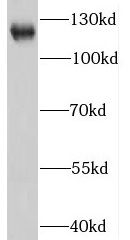Products
IFIH1 antibody
| Synonyms: | Interferon-induced helicase C domain-containing protein 1|Clinically amyopathic dermatomyositis autoantigen 140 kDa (CADM-140 autoantigen)|Helicase with 2 CARD domains (Helicard)|Interferon-induced with helicase C domain protein 1|Melanoma differentiation-associated protein 5 (MDA-5)|Murabutide down-regulated protein|RIG-I-like receptor 2 (RLR-2)|RNA helicase-DEAD box protein 116|IFIH1|MDA5|RH116 antibody | ||
| Catalogue No.: | FNab04134 | Reactivity: | Human |
| Host: | Rabbit | Tested Application: | ELISA, WB, IP |
| Clonality: | polyclonal | Isotype: | IgG |
| Size | Price |
|---|---|
| 100µg | Inquiry |
- SPECIFICATIONS
- FIGURES
- CONDITIONS
- FAQS
- Product Name
- IFIH1 antibody
- Catalogue No.
- FNab04134
- Size
- 100μg
- Form
- liquid
- Purification
- Immunogen affinity purified
- Purity
- ≥95% as determined by SDS-PAGE
- Clonality
- polyclonal
- Isotype
- IgG
- Storage
- PBS with 0.02% sodium azide and 50% glycerol pH 7.3, -20℃ for 12 months(Avoid repeated freeze / thaw cycles.)
- Immunogen
- interferon induced with helicase C domain 1
- Alternative Names
- Interferon-induced helicase C domain-containing protein 1|Clinically amyopathic dermatomyositis autoantigen 140 kDa (CADM-140 autoantigen)|Helicase with 2 CARD domains (Helicard)|Interferon-induced with helicase C domain protein 1|Melanoma differentiation-associated protein 5 (MDA-5)|Murabutide down-regulated protein|RIG-I-like receptor 2 (RLR-2)|RNA helicase-DEAD box protein 116|IFIH1|MDA5|RH116 antibody
- UniProt ID
- Q9BYX4
- Observed MW
- 117-125 kDa
- Tested Applications
- ELISA, WB, IP
- Recommended dilution
- WB: 1:500-1:2000; IP: 1:200-1:2000
 Jurkat cells were subjected to SDS PAGE followed by western blot with FNab04134(IFIH1 antibody) at dilution of 1:1500
Jurkat cells were subjected to SDS PAGE followed by western blot with FNab04134(IFIH1 antibody) at dilution of 1:1500
 IP result of anti-IFIH1(IP:FNab04134, 4ug; Detection:FNab04134 1:300) with Jurkat cells lysate 4000 ug
IP result of anti-IFIH1(IP:FNab04134, 4ug; Detection:FNab04134 1:300) with Jurkat cells lysate 4000 ug
- Background
- Innate immune receptor which acts as a cytoplasmic sensor of viral nucleic acids and plays a major role in sensing viral infection and in the activation of a cascade of antiviral responses including the induction of type I interferons and proinflammatory cytokines. Its ligands include mRNA lacking 2'-O-methylation at their 5' cap and long-dsRNA(>1 kb in length). Upon ligand binding it associates with mitochondria antiviral signaling protein(MAVS/IPS1) which activates the IKK-related kinases: TBK1 and IKBKE which phosphorylate interferon regulatory factors: IRF3 and IRF7 which in turn activate transcription of antiviral immunological genes, including interferons(IFNs); IFN-alpha and IFN-beta. Responsible for detecting the Picornaviridae family members such as encephalomyocarditis virus(EMCV) and mengo encephalomyocarditis virus(ENMG). Can also detect other viruses such as dengue virus(DENV), west Nile virus(WNV), and reovirus. Also involved in antiviral signaling in response to viruses containing a dsDNA genome, such as vaccinia virus. Plays an important role in amplifying innate immune signaling through recognition of RNA metabolites that are produced during virus infection by ribonuclease L(RNase L). May play an important role in enhancing natural killer cell function and may be involved in growth inhibition and apoptosis in several tumor cell lines.
How many times can antibodies be recycled?
First, usually it's not suggested to recycle antibodies. After use, buffer system of antibodies has changed. The storage condition of recycled antibodies for different customers also varies. Thus, the performance efficiency of recycled antibodies can’t be guaranteed. Besides, FineTest ever conducted the antibody recycling assay. Assay results show recycling times of different antibodies also varies. Usually, higher antibody titer allows more repeated use. Customers can determine based on experimental requirements.
Notes: After incubation, we recycle rest antibodies to centrifuge tube and store at 4℃. High titer antibodies can be stored for a minimum of one week. Reuse about three times.
What are components of FineTest antibody buffer?
Components of FineTest antibody buffer are usually PBS with proclin300 or sodium azide, BSA, 50% glycerol. Common preservative is proclin300 or sodium azide, which is widely applied in the lab and industry.
How about the storage temperature and duration of FineTest antibodies?
Most antibodies are stored at -20℃. Directly-labeled flow cytometry antibodies should be stored at 2 - 8℃. The shelf life is one year. If after sales issues for purchased antibodies appear, return or replacement is available. Usually, antibodies can be still used after the one-year warranty. We can offer technical support services.
Is dilution required for FineTest antibodies? What’s the dilute solution?
Directly-labeled flow cytometry antibodies are ready-to-use without dilution. Other antibodies are usually concentrated. Follow the dilution ratio suggested in the manual. Dilute solution for different experiments also varies. Common antibody dilution buffers are acceptable(e.g. PBST, TBST, antibody blocking buffer).
How to retrieve antibodies for immunohistochemistry?
Common retrieval buffers: Tris-EDTA Buffer(pH 9.0); Citrate Buffer(pH 6.0)
Heat induced antibody retrieval:
Method 1: Water-bath heating: Put the beaker with retrieval buffer and slide in the boiling water bath. Keep the boiling state for 15min. Naturally cool to room temperature;
Method 2: Microwave retrieval: Put the beaker with retrieval buffer and slide in the microwave oven. Heat at high power for 5min, Switch OFF for 3min, Heat at medium power for 5min. Naturally cool to room temperature.
How to choose secondary antibodies?
(1) Secondary antibodies react with primary antibodies. Thus, secondary antibodies should be against host species of primary antibodies. E.g. If the primary antibody is derived from rabbit, the relevant secondary antibody should be against rabbit. E.g. goat anti rabbit or donkey anti rabbit.
(2) Choose secondary antibody conjugates according to the experimental type, e.g. ELISA, WB, IHC etc. Common enzyme conjugated secondary antibodies are labelled by HRP, AP etc. Fluorescin or dye labelled secondary antibodies are applied in immunofluorescence and flow cytometry(e.g. FITC, Cy3).
